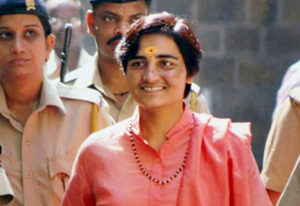New Delhi, April 15: The Supreme Court today asked the trial court in Maharashtra to decide on the bail pleas of accused persons, including Sadhvi Pragya Singh Thakur, within a month in the 2008 Malegaon blast case.
A bench of Justices F M I Kalifulla and Shiva Kirti Singh also said the provisions of stringent Maharashtra Control of Organised Crimes Act (MCOCA) would not be considered while dealing with the bail applications of accused persons, barring one Rakesh D Dhawde on the grounds that he had been involved in other similar offences prior to the Malegaon blast.
The accused persons had approached the apex court challenging the denial of their bail by the Bombay High Court.
They had also sought direction against the High Court order restoring the charges under the stringent anti-organised crime law MCOCA.
The High Court had ordered that Pragya and ten other accused in the Malegaon bomb blast case would face trial under MCOCA and quashed the decision of a Special Court which had dropped the charges under the special law.
Among the other high-profile accused in the case is Lt Col S P Purohit.
Seven people were killed in a bomb blast on September 29, 2008, at Malegaon, a communally-sensitive textile town in Nasik district of North Maharashtra. The probe into the blast has brought into focus the activities of some right-wing Hindu groups.
A Special MCOCA court had earlier ruled that Anti Terrorist Squad had wrongly applied MCOCA in the case against Pragya, Purohit and nine others.
The 4,000-page chargesheet had alleged that Malegaon was selected as the blast target because of a sizeable Muslim population there. It named Pragya Thakur, Purohit and another accused, Swami Dayanand Pandey, as the key conspirators.
The chargesheet had further alleged it was Pandey who had instructed Purohit to arrange RDX, while Pragya owned the motorcycle which was used in the blast.
Ajay Rahirkar, another accused, allegedly organised funds for the terror act, while conspiracy meetings were held at Bhonsala Military School in Nasik.
Rakesh Dhawde, Ramesh Upadhyay, Shyamlal Sahu, Shivnarain Kalsangra, Sudhakar Chaturvedi, Jagdish Mhatre and Sameer Kulkarni were the other accused.





Comments
Add new comment